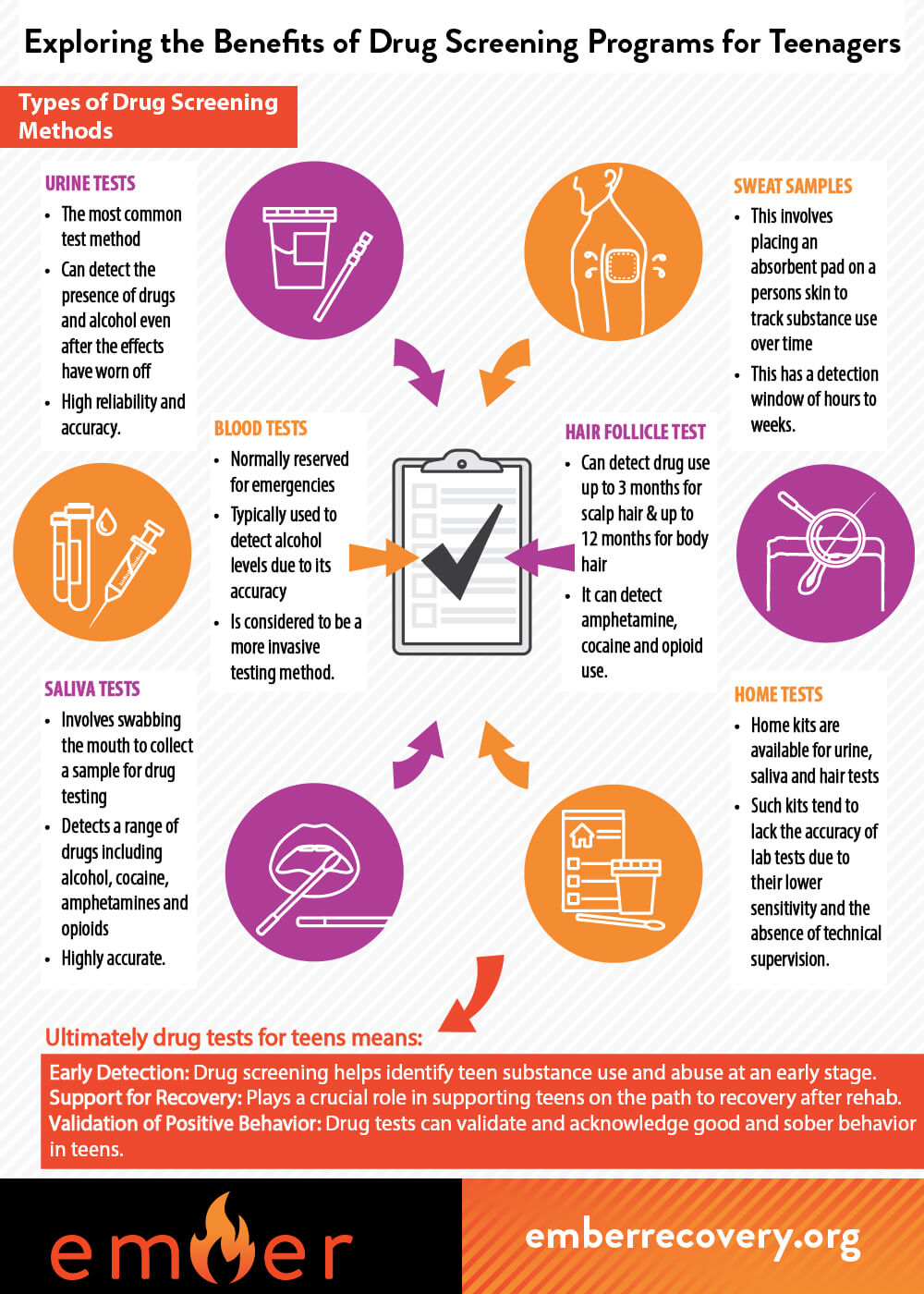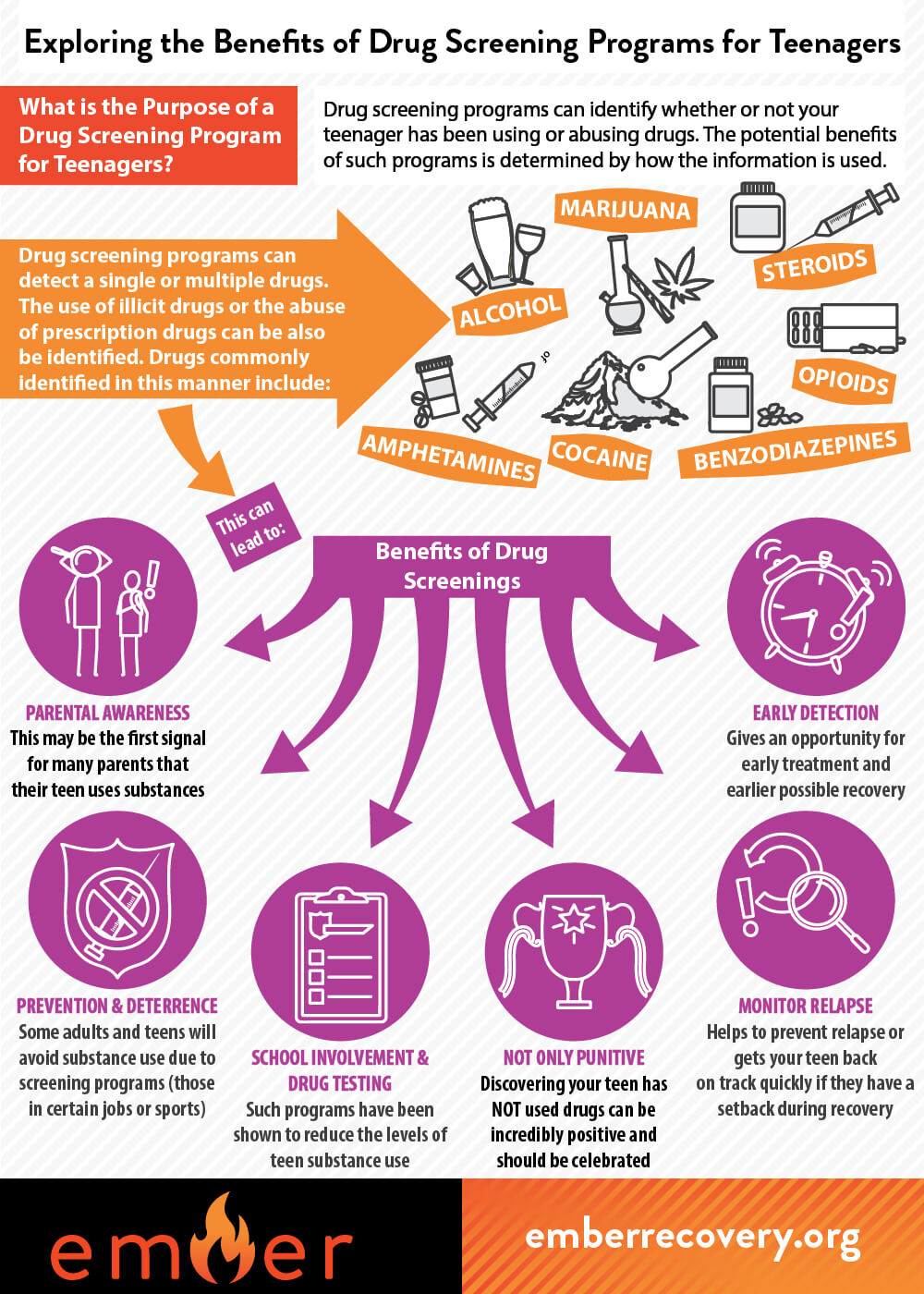Drug screening programs for teenagers can help to confirm or disclaim suspicions that a parent or guardian may have about their teen’s activity. While they can serve as a way of early detection and help teens seek treatment, it’s essential to be aware of all aspects of these programs.
We’ll dive deeper into this delicate topic so you can make an informed decision about whether your teen should participate in these screenings. As we look at the purpose and different types of screenings, we’ll also explore the potential benefits.
What is the Purpose of a Drug Screening Program for Teenagers?
The purpose of a drug screening program for teenagers is to look for drug use and misuse. 1 This can include the use of illegal drugs and the abuse of prescription drugs, such as taking medicines that are not prescribed.
Keep in mind that drug screening is not always done in a manner that is meant to be punitive – especially when a teenager is in recovery. Drug screening for a teen in recovery can be used as a way to confirm the teen’s abstinence, which can then be celebrated and reinforced!
A drug test can check for a single drug or a group of drugs in your body. These drugs can include:
- Alcohol
- Amphetamines
- Benzodiazepines
- Cocaine
- Marijuana
- Opioids
- Steroids
If a drug test shows that a teen has any substances in their bodies, it provides for early detection of substance use, leading to earlier treatment and recovery. Parents often are unaware that their child is using drugs before it’s too late.
Drug screening can also show if a teen has relapsed during recovery. Getting back on track as soon as possible is essential when this happens. By knowing that someone has started to use drugs again, they can begin to receive the support they need to resume the recovery process sooner rather than later.
Types of Drug Screening Methods
There are several different types of drug screening methods available. These include 2:
Urine Test
A urine test is the most common type of drug test. This requires a sample of your urine to test for drugs and alcohol. It is known to be accurate when it comes to these types of tests. A urine test will show the presence of a drug in a person’s system even after the drug’s effects have worn off, but the length of time varies by drug.
Blood Test
This is commonly reserved for emergencies. It is typically used to detect alcohol levels because of its precision.
Saliva Tests
A saliva test involves swabbing the mouth to get a sample. A variety of drugs, such as alcohol, amphetamines, cocaine, and opioids, can all be detected using this type of test. It is known to be highly accurate. 3
Sweat Samples
Sweat testing involves the person wearing an absorbent pad on their skin that is collected after a certain amount of time. The results show how much of a substance a person used while they wore the pad. Sweat testing gives a detection window of hours to weeks.
Hair Follicle Tests
A hair follicle sample can detect drug use over time. The results can vary depending on the characteristics of each person’s hair. Scalp hair typically has a detection window of three months, while body hair has a detection window of up to 12 months. This type of test can detect cocaine, opioid, and amphetamine use.
Home Tests
Home tests for urine, saliva, and hair are also available, but their accuracy can be questionable. They are generally less sensitive than the tests done in a lab.
Benefits of Drug Screenings
Drug screening programs for teenagers can provide both teens and parents with many benefits. These include:
Prevention and Deterrence
Many people believe that drug screening programs can act as a deterrent for drug use among both adults and teens. If someone knows they’ll have to undergo a drug test, they may be less likely to try a substance. This can refer to adults who are seeking employment or teens who may want to play a sport.
Early Detection
Studies of young people in drug treatment programs show that some used alcohol and other substances for over two years without their parent’s knowledge. 4 Drug screening can provide early detection to prevent this type of scenario. If parents know about their child’s substance abuse earlier, they can get them the help they need.
Monitor Relapses
Drug screening can also be used as a method of relapse prevention. Those seeking treatment may think twice about relapsing if they know they must undergo a drug screening. Screenings can help to keep people on track with their recovery.
School Involvement & Drug Testing
Some schools use drug screening for students involved in sports and extracurricular activities. Studies show that students who were subject to in-school drug testing reported less substance use than those who did not undergo drug testing. 5
Many benefits can come from drug screening programs for teens. It’s important to have this conversation so your teen can better understand why they may be undergoing any screening and ask the appropriate questions.
Is Your Teen Battling a Substance Abuse Disorder? Contact Ember Recovery
If your teen is battling a substance abuse disorder, call Ember Recovery. Our team specializes in helping teens get the help they need to overcome their substance use and get on the path to recovery. Call us today to find out more about our programs and how you can enroll your teen so they can begin their treatment.
Sources:
[1] https://medlineplus.gov/lab-tests/drug-testing/ [2] https://my.clevelandclinic.org/health/diagnostics/10285-drug-testing [3] https://www.verywellhealth.com/mouth-swab-drug-test-5223475# [4] https://www.healthychildren.org/English/ages-stages/teen/substance-abuse/Pages/Intervention-Strategies.aspx [5] https://ies.ed.gov/ncee/pubs/20104025/index.asp

Andrea Dickerson is a Licensed Therapist and Certified Substance Use Counselor who has worked in behavioral health since 1997. Currently, Andrea is the Director of Behavioral Health, overseeing the Ember residential treatment programs and YSS outpatient counseling clinics throughout Central and North Central Iowa. She became a Motivational Interviewing (MI) trainer in 2006 and provides MI trainings throughout Iowa.
Andrea specializes in working with adolescents and their families and enjoys seeing the family relationships grow through therapy. Andrea is also a CARF International Surveyor, going around North America ensuring behavioral health organizations are meeting required standards.
In her free time, Andrea enjoys cheering on the Iowa Hawkeyes and Chicago Cubs, as well as being an active member of Soroptimist International of the Americas (SIA), a global organization that provides women and girls with access to the education and training they need to achieve economic empowerment. She has been a member of the SI of Des Moines club since 2012 and has been actively involved at the regional level, currently serving as Co-Governor of the Peaks to Plains Region.
Through her involvement in SIA, Andrea has been actively involved in the Dream Programs, coordinating annual Dream It, Be It: Career Support for Girls projects, which give girls the tools they need to achieve their education and career goals, empowering them to break cycles of poverty, violence, and abuse.


